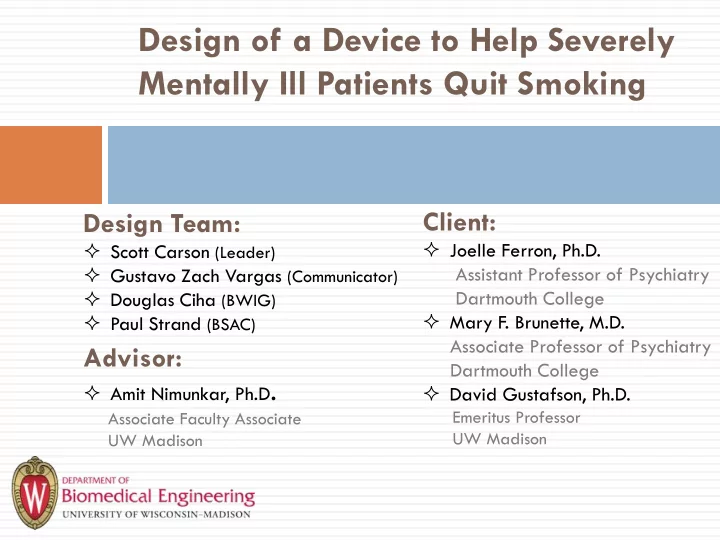

Design of a Device to Help Severely Mentally Ill Patients Quit Smoking Client: Design Team: Joelle Ferron, Ph.D. Scott Carson (Leader) Gustavo Zach Vargas (Communicator) Assistant Professor of Psychiatry Douglas Ciha (BWIG) Dartmouth College Mary F. Brunette, M.D. Paul Strand (BSAC) Associate Professor of Psychiatry Advisor: Dartmouth College Amit Nimunkar, Ph.D . David Gustafson, Ph.D. Emeritus Professor Associate Faculty Associate UW Madison UW Madison
Overview Background Problem Statement Motivation and Product Specifications Physical Case PCB and Circuit Android Application Future Work
Background Tobacco addiction in individuals with Sever Mental Illness(SMI) (Brunette et al., Psychiatric Services , 2011) Cigarette smoking rates in SMI patients: 45% – 90% Cigarette smoking rates in general population: 20%
Background Quitting smoking in SMI patients (Brunette et al., Health Education Research, 2012) Difficulty: Not using the traditional resources Solution: Using a well-designed program for the SMI Constant (24 hours a day) monitoring Access to structured computer programs
Problem Statement To design a cigarette case to help individuals with severe mental illness (SMI) quit smoking through a structured smartphone application interface. The complete system is known as the Pack Pal.
Motivation Research shows: people with nervous disorders want to stop smoking. No successful program/therapy to aid quitting due to resources not being targeted to individuals with SMI. The Pack Pal system is a coach and collects data
Design Specification Case Requirements Sense Opening and closing of the case Number of cigarettes removed Transmit the data to the smartphone wirelessly Smartphone Requirements Deploy countermeasures to discourage smoking behavior Record trigger and rate craving strength Analyze the data from the case Send weekly updates to the subject
Block Diagram Hardware Cigarette Case Microcontroller Phone Sensor 2 (Number of Power Bluetooth Module cigarettes taken) Subject Sensor 1 (Case Status Opened/Closed)
Case Design Sensor Holder Dimensions: 5.15’’ x 3.75” x 1.8” Cigarette Holder Circuit Holder Sensor ABS Plastic Future Work Cover Battery Holder Cigarette Holder Aluminum Shell
Cigarette Sensor Design Options Cigarette Sensing Accuracy and consistency Low power consumption Minimize components Options Integrated IR LED/sensor Depressible switch
Design Matrices Depressible Integrated IR Cigarette Sensing Switch LED/Sensor Power Consumption (.6) 4 1 Components (.4) 3 3 Reliability (.8) 4.5 4.5 Implementation (.3) 4 2 TOTAL 8.4 6
Wall-charge Lithium Ion Battery Voltage: 3.7 V Capacity: 2600 mAh Chargeable without being removed from the case Theoretical life at 50 mA: 52 hours
34 Hour Battery Test (sec)
Smartcase Using Mbed prototyping board Handles case state(open/closed) Counts cigarettes Communicates with application via Bluetooth Broadcasts data Waits for reply
PCB Design in Altium Component Schematics Circuit Connections Component Foot Prints Board to Board Connections
Main Circuit
Sensor Circuit
PCB Design Component Footprints Standard Custom
Android Application Specifications User interface Easy to use, large buttons, explanative text Data Storage Accessibility Representation Program design and implementation Always running (background process) Handling Bluetooth communication
Android Application Framework Framework Layout (http://ows.edb.utexas.edu/site/collaborative-bluetooth-edumanet/android-sdk-2)
Major Application Components User Interface (UI) The part of the application that the user will interact with on a regular basis. Assigned Views upon runtime Considerations: responsiveness, intuitiveness, aesthetics Bluetooth Handler Asynchronously handle device discovery, connection, and transmission.
User Interface Screenshots
Bluetooth Basics Serial Port Profile (SPP) Application representation of virtual serial ports RFCOMM Low level emulation of RS-232 serial communication Bluetooth Profile Stack (https://www.bluetooth.org/Building/HowTechnologyWorks/ProfilesAndProtocols/HSP.htm)
Future Work and Implementation Future Work Implementation PCB Design Participant Testing Application Clinical Trial Bluetooth connectivity Case integration
Acknowledgments Prof. Joelle Ferron (Client) Dartmouth College Department of Psychiatry Prof. Mary Brunette (Client) Dartmouth College Department of Psychiatry Prof. David Gustafson (Client) UW Madison Department of Industrial and Systems Engineering Dr. Amit Nimunkar (Advisor) UW Madison Department of Biomedical Engineering
References 1. Brunette, Mary, Ferron, Joelle, Devitt, Timothy, Geiger, Pamela, Martin, Wendy, Pratt, Sarah, Santos, Meghan, & McHugo, Gregory (2011). Do smoking cessation websites meet the needs of smokers with severe mental illnesses? Health Education Research Vol.27 no.2 2012. Retrieved May 20, 2012. 2. Brunette, M., Ferron, J., McHugo, G., Davis, K., Devitt, T., Wilkness, S., & Drake, R.. (2011). An Electronic Decision Support System to Motivate People With Severe Mental Illnesses to Quit Smoking. Psychiatric Services, 62 (4), 360-6. Retrieved May 20, 2012, from Psychology Module. (Document ID: 2312884271). 3. Ferron, J., Brunette, M., He, X., Xie, H., McHugo, G., & Drake, R.. (2011). Course of Smoking and Quit Attempts Among Clients With Co-occurring Severe Mental Illness and Substance Use Disorders. Psychiatric Services, 62 (4), 353-9. Retrieved May 20, 2012, from Psychology Module. 4. Ferron, J., Brunette, M., McHugo, G., Devitt, T., Martin, W., & Drake, R.. (2011). Developing a Quit Smoking Website That is Usable by People with Severe Mental Illnesses. Psychiatric Rehabilitation Journal 2011, Volume 35, No. 2, 111 – 116. Retrieved June 6, 2012. 5. Grant BF, Hasin DS, Chou SP et al. Nicotine dependence and psychiatric disorders in the United States: results from the National Epidemiologic Survey on Alcohol and Related Conditions. Arch Gen Psychiatry 2004; 61: 1107 – 15. 6. Lucksted A, Dixon LB, Sembly JB. A focus group pilot study of tobacco smoking among psychosocial rehabilitation clients. Psychiatr Serv 2000; 51: 1544 – 8. 7. Morris CD, Waxmonsky JA, May MG et al. What do persons with mental illnesses need to quit smoking? Mental health consumer and provider perspectives. Psychiatry Rehabilitation Journal 2009; 32: 276 – 84. 8. National Cancer Institute. Smoking. Retrieved June 5,2012 from http://www.nlm.nih.gov/medlineplus/smoking.html. 9. Weinberger AH, Reutenauer EL, Vessicchio JC et al. Survey of clinician attitudes toward smoking cessation for psychiatric and substance abusing clients. J Addict Dis 2008; 27:55.
Any Questions?
Recommend
More recommend